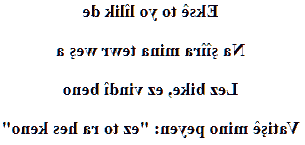Zazaki love poem
Lîlik
Eksê to yo lîlik de
Na şîîra mina tewr weş a
Lez bike, ez vindî beno
Vatişê mino peyen: "ez to ra hes keno"


→ French poem ←
Zazaki language
Young Zaza woman this translation of my love poem is for you! You live high up in the mountains of Turkey. Many of your family left this place to join big cities and modernity. Others have even migrated further afield to try the adventure in Europe. But you, you wait, you wait! He passed by your village a few years ago, he will come back, he promised you ... so, since, you wait him!
Zazaki (other possible names and dialects : kirmancki, dimli, zaza, kirdki), is a Kurdish dialect spoken by the Zazas in northern Kurdistan in Turkey.
The Zaza Kurds have settled in twelve governorates of northern Kurdistan, within the borders of Turkey. In some of these governorates, Bingöl (Çewlîg), Elazığ (Xarpêt) and Tunceli (Dêrsim) for example, the Zazas are in the majority. In other governorates (Diyarbekir, Erzincan, Bitlis, Riha, Adiyaman) they live in several towns or in small territories.
The Kurds have been a people forgotten and abused throughout history, an ethnicity currently shared over several countries (Turkey, Iran, Iraq, Syria). In general Zaza designates the people and Zazaki their language, which is an Indo-European language of the Western Iranian group.
There are perhaps 2 million Zazas to practice this language, they live in the east of the country, more precisely in the south-east of Anatolia. Their diaspora is large in number, in many European countries.
The Zazas were considered to be Kurds, speaking a particular dialect of Kurdish, but for certain linguists, and even for certain Zaza since the beginning of 1900, the zaza would be a full language, and not a Kurdish dialect.
Zazaki bears real resemblances to Parthian, a dead northwest Iranian language, which was only the language of a small region, but became the language of the Parthian Empire, and spread across Mesopotamia, Iran, Armenia, as far as Central Asia. The closest language to zaza, is Gorani (Hawrami) spoken in Iran and Iraq.
Zazaki can be separated into three main dialect groups: north, center and south, which themselves have variants. In general all these dialects are mutually understandable, at least orally.
Zaza as for many languages is an oral language, the language of a minority ethnic group without autonomy in Turkey. It was not until the 1980s with the emigration of many Kurds, that we could find writings in Zaza.
Today, Turkey continues a policy of assimilation, which associated with the tensions within the Kurdish people, does not suggest a real cultural and linguistic development.